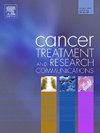Rationale and design of the PAMSARC (pasireotide as maintenance treatment with monthly deep intramuscular injection in SSTR2/3/5-expressing synovial sarcoma and desmoplastic small round cell tumor) multicenter phase 2 trial
IF 2.4
Q3 Medicine
引用次数: 0
Abstract
Background
Desmoplastic small round cell tumor (DSRCT) and synovial sarcoma (SySa) are rare cancers primarily affecting adolescents and young adults. Prognosis is generally poor, particularly upon metastasis, due to limited efficacy of chemotherapies and the lack of molecular mechanism-based approaches. Recently, overexpression of somatostatin receptors (SSTR) 2, 3, and 5 was described in high proportions of DSRCT and SySa. Given the efficacy of somatostatin analogs in other SSTR-expressing malignancies, we will evaluate pasireotide as maintenance therapy in patients with locally advanced or metastatic DSRCT and SySa.
Trial design
PAMSARC (Pasireotide as Maintenance Treatment With Monthly Deep Intramuscular Injection in SSTR2/3/5-Expressing SySa and DSRCT) is an open-label, multicentric, single-arm phase II trial evaluating pasireotide maintenance therapy in adolescents and adults with locally advanced or metastatic SySa or DSRCT who have achieved stable disease or partial response after completion of chemotherapy. Molecular eligibility is determined by SSTR2/3/5 expression via RNA analysis performed within the precision oncology programs MASTER and INFORM. Due to pasireotide’s regulatory approval being limited to adults, enrollment follows a “3 + 3 staggered” approach for both adults and adolescents. Treatment consists of pasireotide administered as intragluteal depot injection every 28±3 days. The primary endpoint is progression-free survival; secondary and exploratory analyses include overall survival, patient-reported outcomes, and disease monitoring via liquid biopsies. The sample size calculation assumes exponential data, with 90 % power to detect a hazard ratio of 0.5, requiring 28 participants with an expected 22 events during the study. Sensitivity analyses are planned for both age groups and disease types.
Trial registration numbers
EUCT: 2024-511935-86-00-00; ClinicalTrials.gov: NCT06456359
PAMSARC (pasireotide)作为每月深层肌内注射治疗表达sstr2 /3/5的滑膜肉瘤和结扎性小圆细胞瘤的多中心2期临床试验的基本原理和设计
结缔组织增生小圆细胞瘤(DSRCT)和滑膜肉瘤(SySa)是罕见的癌症,主要影响青少年和年轻人。由于化疗疗效有限和缺乏基于分子机制的方法,预后通常较差,特别是转移后。近年来,生长抑素受体(SSTR) 2、3和5在DSRCT和SySa中高比例过表达。鉴于生长抑素类似物在其他表达sstr的恶性肿瘤中的疗效,我们将评估pasireotide作为局部晚期或转移性DSRCT和SySa患者的维持治疗。pamsarc (Pasireotide作为维持治疗,每月深层肌内注射表达SySa和DSRCT的sstr2 /3/5)是一项开放标签,多中心,单组II期试验,评估Pasireotide维持治疗在完成化疗后病情稳定或部分缓解的局部晚期或转移性SySa或DSRCT的青少年和成人。通过精确肿瘤学项目MASTER和INFORM进行的RNA分析,通过SSTR2/3/5的表达来确定分子资格。由于pasireotide的监管批准仅限于成人,因此成人和青少年的入组遵循“3 + 3交错”的方法。治疗方法为每28±3天静脉注射帕西罗肽。主要终点是无进展生存期;次要和探索性分析包括总生存率、患者报告的结果和通过液体活检进行的疾病监测。样本量的计算采用指数数据,有90%的能力检测到0.5的风险比,需要28名参与者,在研究期间预计有22个事件。计划对年龄组和疾病类型进行敏感性分析。试验注册号seuct: 2024-511935-86-00-00;ClinicalTrials.gov: NCT06456359
本文章由计算机程序翻译,如有差异,请以英文原文为准。
求助全文
约1分钟内获得全文
求助全文
来源期刊

Cancer treatment and research communications
Medicine-Oncology
CiteScore
4.30
自引率
0.00%
发文量
148
审稿时长
56 days
期刊介绍:
Cancer Treatment and Research Communications is an international peer-reviewed publication dedicated to providing comprehensive basic, translational, and clinical oncology research. The journal is devoted to articles on detection, diagnosis, prevention, policy, and treatment of cancer and provides a global forum for the nurturing and development of future generations of oncology scientists. Cancer Treatment and Research Communications publishes comprehensive reviews and original studies describing various aspects of basic through clinical research of all tumor types. The journal also accepts clinical studies in oncology, with an emphasis on prospective early phase clinical trials. Specific areas of interest include basic, translational, and clinical research and mechanistic approaches; cancer biology; molecular carcinogenesis; genetics and genomics; stem cell and developmental biology; immunology; molecular and cellular oncology; systems biology; drug sensitivity and resistance; gene and antisense therapy; pathology, markers, and prognostic indicators; chemoprevention strategies; multimodality therapy; cancer policy; and integration of various approaches. Our mission is to be the premier source of relevant information through promoting excellence in research and facilitating the timely translation of that science to health care and clinical practice.
 求助内容:
求助内容: 应助结果提醒方式:
应助结果提醒方式:


